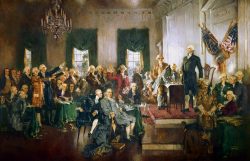
A major con game threatens the future of this country, and Arkansas is at risk of becoming one of the players. Three resolutions (HJR1022, SJR2, and HJR1001) have been proposed in the Arkansas legislature this session to call a Constitutional convention (ConCon), the first of its kind since 1787. One of these, HJR1022, passed out of committee this week and heads to the House Floor next week.
Through these resolutions, corporate- and special interest-led groups such as the American Legislative Exchange Council (ALEC) and the TEA Party are making Arkansas a pawn in their national effort to fundamentally change the very document that has protected our rights for over 200 years.
Under Article V of the U.S. Constitution, 34 states must pass resolutions compelling the U.S. Congress to convene a convention to consider amendments. To date, ConCon backers claim to have 28 states, including Arkansas, calling for a convention focused on a balanced budget amendment. So why do these resolutions matter now?
Certainly, the dangers of a balanced budget amendment to the Constitution are well documented and strongly opposed by policy experts and Nobel laureate economists; however, these resolutions go much further and potentially pose an even bigger and more dangerous threat. This new “con” calls for a broader constitutional convention to consider amendments that would fundamentally alter the powers and scope of our government through imposing fiscal restraints on the federal government, limiting the power and jurisdiction of the federal government, and limiting the terms of members of Congress.
To date, eight states have passed resolutions calling for this broader type of convention, and there are many reasons Arkansas should not be the ninth such state:
First, holding a ConCon now after the divisive and tumultuous elections of 2016 would be very dangerous for this country. The country is intensely and deeply divided politically, and the high level of mistrust and anxiety would only worsen if attempts were made to force a convention. We would find ourselves mired in long political battles from which the country might never recover. Given the current state of political affairs, any chance or hope there is of national healing or bringing the country back to together, however small, could be lost for a very long time.
Second, no matter what the Arkansas General Assembly might put in the language of its resolution calling for a ConCon, it and other state legislatures would be unable to limit the agenda at a convention or even the ground rules under which it operates. Once called, there would be no legal check on the Convention from the courts or any other government institution. The Convention would be free to rewrite or cast aside the most fundamental protections in the U.S. Constitution. No one knows what might happen. As the late Justice Antonin Scalia once said, “I certainly would not want a constitutional convention. Whoa! Who knows what would come out of it.”
Third, there is little doubt that the special interest groups calling for a ConCon would seek to influence the agenda at the convention, possibly resulting in policy changes that would impose undue burdens and hardships on particular groups in our state. Why? It’s highly likely that the amendments adopted at a convention would shift immense powers back to the states and sharply curtail the ability of the federal government to raise revenue and pay for programs that have served this country well, including programs that have protected the economic well-being for disadvantaged and poor populations.
Finally, for all of its shortcomings, the federal government has a better track record of improving the economic well-being and protecting the legal rights of disadvantaged populations than many state legislatures have, especially in the South. Those protections, too, would be in jeopardy.
So the game is afoot. The Con of the ConCon is on. Here’s hoping Arkansas chooses not to play.
